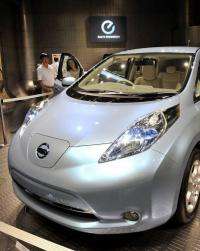Electric cars can succeed in oil-rich states: Ghosn

Electric cars can be successful in Gulf countries and other oil-rich states, but only with initial government help, the president and CEO of Nissan and Renault said on Monday in Abu Dhabi.
"Yes, I think it can," Carlos Ghosn said when asked if the electric car could be successful in oil-producing countries, adding that "it will depend on how much initial support the specific government would give."
The need for initial assistance is not, however, limited to oil-rich countries, he said.
"The electric car will be successful in the United States and in Japan and in Europe" because governments "have decided to support the consumer in order to jumpstart the sales," Ghosn told reporters in Abu Dhabi.
The United States, Japan and various European countries offer incentives to make low- and zero-emissions vehicles cheaper for buyers.
Such support is key, he said.
"If the US government was saying, 'look, I'm not gonna give any incentive for electric cars,' I don't think we would" launch electric cars there, Ghosn added.
Nissan is due to launch its first electric car, the Leaf, later this year.
The car is to have a range of more than 160 kilometres (100 miles) on a charge, a top speed of more than 140 kilometres (90 miles) per hour, and will be powered by a lithium battery.
Ghosn said in a previous trip to Abu Dhabi in February that a Nissan electric light commercial vehicle, luxury sedan and a small "city car" were also in the works, along with four Renault electric vehicles.
On Monday he said that Nissan and Renault have "no plan" to expand production capacity in the Middle East in the absence of a free-trade agreement between Arab countries.
Nissan has a factory in Egypt, and a Renault-managed factory is under construction in Morocco, Ghosn said.
"As long as you don't have a free trade or at least an effective free trade in the Mideast, it's gonna be very difficult to go and make an investment of a large capacity if you can't sell in a seamless way in the Arab countries," he said.
Free trade in the Arab world would be "an incentive for carmakers to establish capacity in the Mideast," he said.
Ghosn also said 2010 is likely to be a record year in terms of industry-wide global car sales.
"There is no doubt (about) the fact that 2010 will end up being the highest year in terms of... total global car sales," he said.
(c) 2010 AFP





















